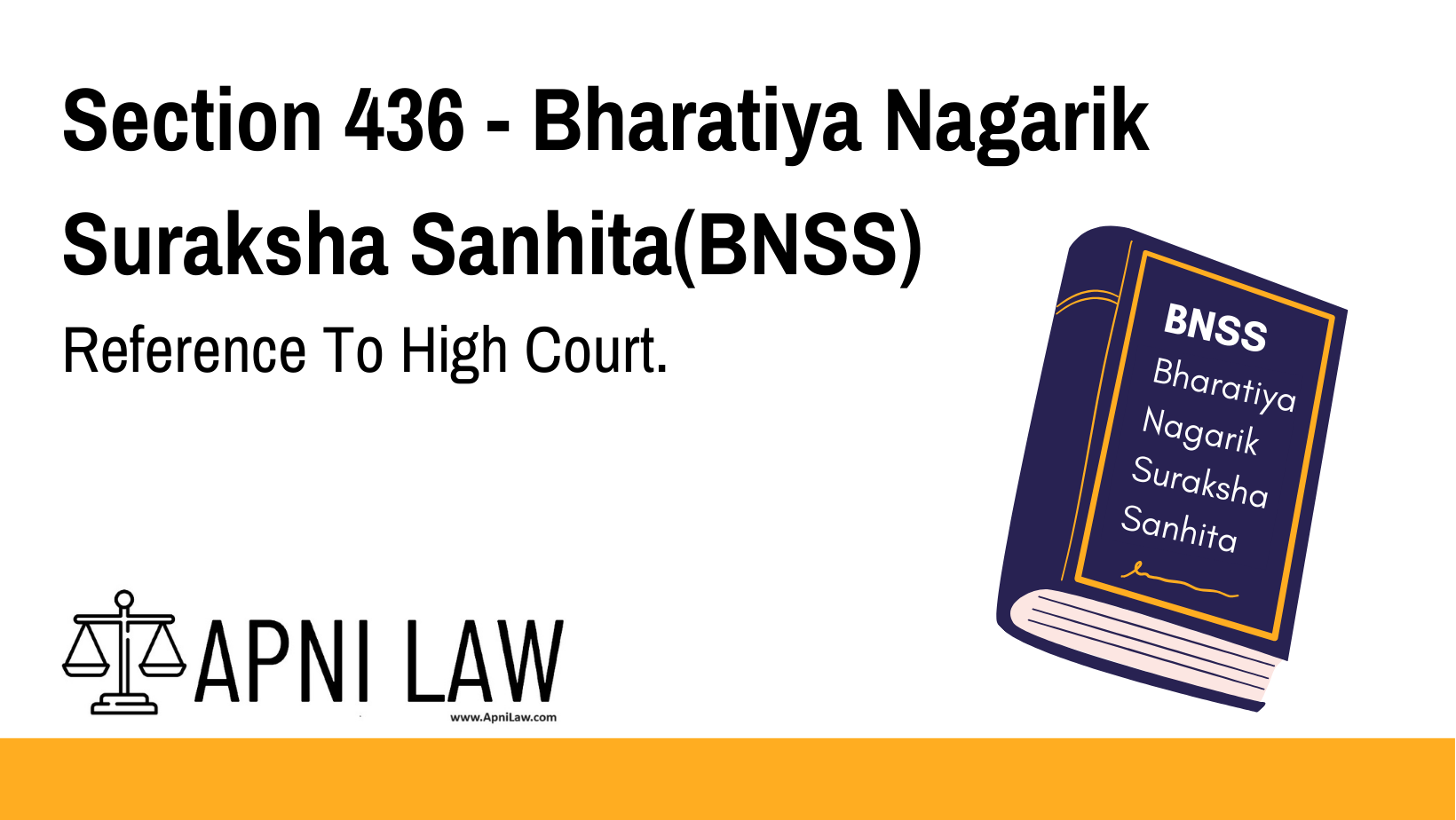Code: Section 436 BNSS
Section 436
(1) Where any Court is satisfied that a case pending before it involves a question as to the validity of any Act, Ordinance, or Regulation or of any provision contained in an Act, Ordinance, or Regulation, the determination of which is necessary for the disposal of the case, and is of the opinion that such Act, Ordinance, Regulation, or provision is invalid or inoperative, but has not been so declared by the High Court to which that Court is subordinate or by the Supreme Court, the Court shall state a case setting out its opinion and the reasons therefor, and refer the same for the decision of the High Court.
Explanation: In this section, “Regulation” means any Regulation as defined in the General Clauses Act, 1897, or in the General Clauses Act of a State.
(2) A Court of Session may, if it thinks fit in any case pending before it to which the provisions of sub-section (1) do not apply, refer for the decision of the High Court any question of law arising in the hearing of such case.
(3) Any Court making a reference to the High Court under sub-section (1) or sub-section (2) may, pending the decision of the High Court thereon, either commit the accused to jail or release him on bail to appear when called upon.
Explanation of Section 436 BNSS
Section 436 empowers a Court to refer legal questions regarding the validity of any Act, Ordinance, Regulation, or specific provisions of such legislation to the High Court for a decision. This ensures that a lower court can seek clarity from a higher court when unsure about the constitutionality or application of a law that is crucial to resolving a case.
Key Provisions:
- Reference to High Court for Legal Validity:
- If a Court (other than the High Court) believes that a case involves a question about the validity of an Act, Ordinance, Regulation, or any specific provision that has not been previously declared invalid by the High Court or Supreme Court, it must refer the matter to the High Court for clarification.
- The Court must provide its opinion and the reasons for thinking the provision or law is invalid.
- Referral by Court of Session:
- A Court of Session can refer any legal question arising during a case (even if it does not involve the validity of any legislation) to the High Court for legal clarification.
- Bail or Custody Pending Decision:
- While awaiting the decision from the High Court, the Court that made the reference can either:
- Commit the accused to jail.
- Or release the accused on bail, requiring them to appear when called upon by the Court.
- While awaiting the decision from the High Court, the Court that made the reference can either:
Illustration
Example 1: Legal Question Regarding the Validity of a Law
A trial court is hearing a case where the accused is charged under a law that the court believes may be unconstitutional. The court does not have the authority to declare the law invalid, so it refers the case to the High Court to decide if the law is valid or not before continuing the case.
Example 2: Court of Session Referring a Legal Question
In a case being heard in a Court of Session, a legal question arises that the Court of Session feels could affect the outcome of the trial. The Court of Session may refer this question of law to the High Court for a definitive ruling.
Example 3: Accused’s Bail Pending High Court’s Decision
A trial court refers a legal question to the High Court and, while waiting for the decision, the court releases the accused on bail, allowing them to continue their daily life but requiring them to appear before the Court when necessary.
Common Questions and Answers on Section 436 BNSS
1. What happens if a court is unsure about the validity of a law?
- Answer: If the court believes the law in question may be invalid or unconstitutional, it will refer the issue to the High Court for a decision. The court will state its opinion and reasons for the referral.
2. Can a Court of Session refer a case to the High Court?
- Answer: Yes, a Court of Session can refer any question of law that arises during a case to the High Court. This can be done even if the case does not concern the validity of a law.
3. What happens to the accused during the referral process?
- Answer: While awaiting the decision from the High Court, the court can either send the accused to jail or release them on bail, depending on the circumstances.
4. Can the High Court directly invalidate laws or regulations?
- Answer: Yes, if the High Court finds a law or regulation to be invalid, it has the authority to make such a declaration. If this has not been done previously by the Supreme Court or High Court, the lower court may refer the matter to the High Court.
Conclusion
Section 436 allows lower courts to seek guidance from the High Court when they are uncertain about the validity of a law, ordinance, regulation, or provision crucial to the case. This ensures that legal matters are clarified before proceeding with a case, maintaining judicial consistency and fairness. Courts are also given the flexibility to either detain the accused or release them on bail while awaiting the decision of the High Court.








